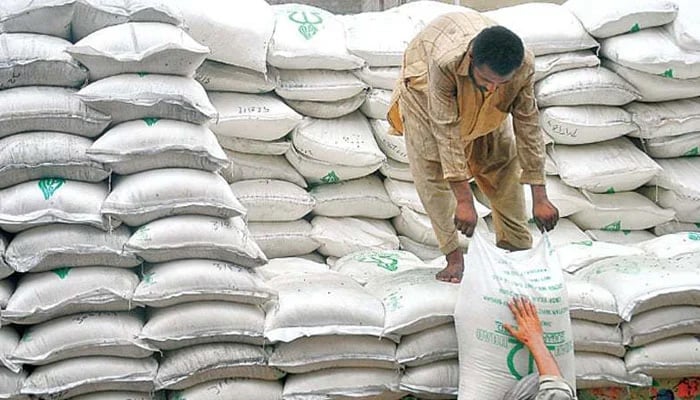Farmers’ body urges government to address urea shortage, price hike
LAHORE Pakistan Kissan Ittehad (PKI), a farmers' body, on Tuesday urged the government to take appropriate measures to bridge the gap of 600,000 tonnes in urea manufacturing and ensure uniform pricing across the country.
PKI President Khalid Mahmood Khokhar said the country is facing a severe urea shortage due to low domestic production and delayed imports.
"The annual urea demand is estimated at 7 million tonnes, while the domestic industry can only produce 6.4 million tonnes," Khokhar said in a statement. "The imports of 210,000 tonnes, expected to arrive in December 2023 and January 2024, are not enough to meet the shortfall."
Khokhar also highlighted the issue of price exploitation by middlemen, who charge farmers around Rs1,000 per bag above the maximum retail prices set by manufacturers. "This practice results in black money of over Rs120 billion annually from farmers," he said.
He blamed the variable gas charges imposed by the government on different urea plants for creating price differentials and enabling overcharging. "The government should enforce uniform urea pricing nationwide, as historically practiced, to deter middlemen from profiteering."
Khokhar said the current urea price of around Rs3,500 per bag is too high for small farmers, who constitute 90 percent of the farming community. "The urea price should not be more than Rs3,000 per bag to make farming viable."
He proposed providing year-round gas supply to urea plants to optimize production capacity, developing a long-term strategy for domestic urea availability to ensure food security, and devising an effective mechanism to mitigate the effect of price increases on fertilizers.
Khokhar also called for a prompt decision-making mechanism to prevent farmers from suffering during short supply scenarios.
"Urea is a key fertilizer for Pakistan's agriculture sector, which contributes about 18 percent to the country's gross domestic product and employs about 38 percent of the labor force," he said.
"The urea shortage and price hike could affect the output and profitability of major crops such as wheat, rice, and cotton."
Khokhar further added that, keeping in view the current price situation vis-à-vis crop production costs, farming is gradually becoming unviable, especially for small farmers, who constitute 90 percent of the farming community. "Due to such a disproportionate equation between expense and income, farmers may not be able to cultivate their entire piece of land," he said.
Proposing actionable solutions, Khokhar urged authorities to prioritize year-round gas provisions to urea manufacturing plants. This step aims to optimize domestic industry production capacity to stabilize market prices, minimize reliance on imports, and conserve vital foreign exchange as well.
-
 SpaceX Launches Another Batch Of Satellites From Cape Canaveral During Late-night Mission On Saturday
SpaceX Launches Another Batch Of Satellites From Cape Canaveral During Late-night Mission On Saturday -
 Princess Beatrice, Eugenie Get Pulled Into Parents’ Epstein Row: ‘At Least Stop Clinging!’
Princess Beatrice, Eugenie Get Pulled Into Parents’ Epstein Row: ‘At Least Stop Clinging!’ -
 Inside Kim Kardashian's Brain Aneurysm Diagnosis
Inside Kim Kardashian's Brain Aneurysm Diagnosis -
 Farmers Turn Down Millions As AI Data Centres Target Rural Land
Farmers Turn Down Millions As AI Data Centres Target Rural Land -
 Trump Announces A Rise In Global Tariffs To 15% In Response To Court Ruling, As Trade Tensions Intensify
Trump Announces A Rise In Global Tariffs To 15% In Response To Court Ruling, As Trade Tensions Intensify -
 Chappell Roan Explains Fame's Effect On Mental Health: 'I Might Quit'
Chappell Roan Explains Fame's Effect On Mental Health: 'I Might Quit' -
 AI Processes Medical Data Faster Than Human Teams, Research Finds
AI Processes Medical Data Faster Than Human Teams, Research Finds -
 Sarah Ferguson’s Friend Exposes How She’s Been Since Andrew Mountbatten-Windsor’s Release
Sarah Ferguson’s Friend Exposes How She’s Been Since Andrew Mountbatten-Windsor’s Release -
 Jelly Roll Explains Living With 'severe Depression'
Jelly Roll Explains Living With 'severe Depression' -
 Charli XCX Applauds Dave Grohl’s 'abstract' Spin On Viral ‘Apple’ Dance
Charli XCX Applauds Dave Grohl’s 'abstract' Spin On Viral ‘Apple’ Dance -
 Anna Sawai Opens Up On Portraying Yoko Ono In Beatles Film Series
Anna Sawai Opens Up On Portraying Yoko Ono In Beatles Film Series -
 Eric Dane's Wife Rebecca Gayheart Shares Family Memories Of Late Actor After ALS Death
Eric Dane's Wife Rebecca Gayheart Shares Family Memories Of Late Actor After ALS Death -
 Palace Wants To ‘draw A Line’ Under Andrew Issue: ‘Tried And Convicted’
Palace Wants To ‘draw A Line’ Under Andrew Issue: ‘Tried And Convicted’ -
 Eric Dane's Girlfriend Janell Shirtcliff Pays Him Emotional Tribute After ALS Death
Eric Dane's Girlfriend Janell Shirtcliff Pays Him Emotional Tribute After ALS Death -
 King Charles Faces ‘stuff Of The Nightmares’ Over Jarring Issue
King Charles Faces ‘stuff Of The Nightmares’ Over Jarring Issue -
 Sarah Ferguson Has ‘no Remorse’ Over Jeffrey Epstein Friendship
Sarah Ferguson Has ‘no Remorse’ Over Jeffrey Epstein Friendship




